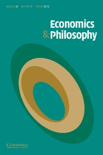
ECONOMICS AND PHILOSOPHY
Scope & Guideline
Fostering Insight at the Nexus of Economics and Philosophy.
Introduction
Aims and Scopes
- Interdisciplinary Approaches:
The journal merges insights from economics and philosophy, encouraging contributions that utilize philosophical methods to address economic issues and vice versa. - Ethical Implications of Economic Theories:
A core focus is on the moral dimensions of economic theories, such as fairness, justice, and equity in economic systems. - Population Ethics and Welfare Economics:
Exploration of normative frameworks for evaluating population policies and welfare economics, including discussions on subjective welfare and distributive justice. - Behavioral Economics and Decision-Making:
Investigates how philosophical concepts can enrich the understanding of behavioral economics, including human rationality and decision-making processes. - Public Policy and Social Justice:
The journal often addresses the implications of economic policies on social justice, equality, and the ethical considerations surrounding public goods and taxation.
Trending and Emerging
- Gender Justice and Equality:
Recent publications increasingly address issues of gender justice, highlighting the ethical implications of economic policies on women and marginalized groups. - Ethics of Climate Change and Environmental Economics:
There is a growing focus on the intersection of economic practices and environmental ethics, particularly concerning climate change policies and their moral implications. - Behavioral Insights and Public Policy:
An emerging trend is the integration of behavioral insights into the analysis of public policy, examining how philosophical concepts can inform better decision-making frameworks. - The Role of Uncertainty in Economics:
Papers exploring the ethical dimensions of decision-making under uncertainty, particularly in the context of economic crises and risks, are becoming more prominent. - Intergenerational Justice:
An increasing number of articles are focusing on the ethical considerations surrounding policies that affect future generations, emphasizing sustainability and equity.
Declining or Waning
- Traditional Economic Theories:
There has been a noticeable decline in the publication of papers solely focused on classical economic theories without a philosophical critique, as the journal has increasingly favored interdisciplinary approaches. - Descriptive Economic Analysis:
Papers that primarily describe economic phenomena without engaging in ethical or philosophical analysis are less common, indicating a shift towards more normative discussions. - Narrowly Defined Economic Models:
Research focusing on highly specialized economic models without broader implications for social justice or ethical considerations appears to be waning, as the journal emphasizes holistic and interdisciplinary perspectives.
Similar Journals

Journal of Economic Methodology
Advancing economic thought through rigorous analysis.The Journal of Economic Methodology is a premier academic publication dedicated to advancing the understanding of economic theories and methodologies, published by Routledge Journals, Taylor & Francis Ltd. With its ISSN 1350-178X and E-ISSN 1469-9427, this esteemed journal has been shaping the discourse in the field since its inception in 1994 and continues to flourish with its converged years extending to 2024. Recognized as a Q1 journal in Economics, Econometrics, and Finance (miscellaneous) for 2023, it proudly ranks #66 out of 242 journals in its category, reflecting its significant impact at the 72nd percentile. The journal serves as a vital platform for researchers, professionals, and students, offering rigorous peer-reviewed articles that explore the critical nature of economic methodology across various contexts. While it does not currently provide open access options, the wealth of knowledge contained within its pages makes it an essential resource for those seeking to deepen their understanding of economics and its analytical frameworks.
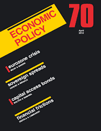
ECONOMIC POLICY
Pioneering Research at the Intersection of Economics and PolicyECONOMIC POLICY is a leading academic journal published by Oxford University Press, focusing on a broad spectrum of topics within the field of economics and related disciplines. With its ISSN 0266-4658 and E-ISSN 1468-0327, the journal serves as a vital platform for disseminating cutting-edge research and innovative policy analysis critical to both scholars and practitioners. As a testament to its quality and significance, ECONOMIC POLICY is classified in the Q1 quartile for both Economics and Econometrics and Management, Monitoring, Policy, and Law, and boasts impressive rankings within Scopus—placing it in the top 25% of its respective fields. Operating from the esteemed Oxford campus in the United Kingdom, the journal has produced a wealth of knowledge since its inception in 1988, with plans to continue shaping economic discourse through 2024 and beyond. While the journal does not offer Open Access options, it remains a cornerstone for anyone dedicated to understanding the complexities of economic policy and its impact on global society.

STUDIES IN PHILOSOPHY AND EDUCATION
Transforming Educational Landscapes through Philosophical InquirySTUDIES IN PHILOSOPHY AND EDUCATION, a reputable journal published by Springer, is nestled in the dynamic intersection of philosophical inquiry and educational theory. With an ISSN of 0039-3746 and an E-ISSN of 1573-191X, this journal has been a significant platform for scholarly discourse since its inception in 1960. Located in the Netherlands, its impressive standing is reflected in its 2023 Scopus rankings, positioned in the Q1 category for Philosophy and Q2 in Education, alongside a commendable 90th percentile in the field of Arts and Humanities. Dedicated to fostering innovative thought and contributing to the evolving landscape of education and philosophy, the journal encourages submissions that explore diverse theoretical frameworks and practical applications. Although not an open-access publication, it remains an essential resource for academics, educators, and researchers aiming to deepen their understanding of the philosophical underpinnings of education. Engage with cutting-edge research and critical analyses that shape the future of educational practices and philosophical thought.
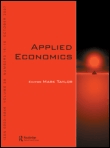
APPLIED ECONOMICS
Fostering Excellence in Econometric ResearchApplied Economics, published by Routledge Journals, Taylor & Francis Ltd, is a revered platform in the field of Economics and Econometrics. Since its inception in 1969, the journal has maintained its commitment to disseminating high-quality research, covering a wide range of topics within applied economics that are critical for understanding and addressing real-world economic issues. With a notable Q2 ranking in Economics and Econometrics and a strong standing in the 67th percentile of Scopus rankings, it serves as an essential resource for researchers, professionals, and students alike, providing insights that bridge theoretical frameworks and practical applications. While the journal is not an Open Access platform, it continues to foster academic discourse and innovation within the economics community, contributing to the ongoing development of evidence-based policies and practices. Its accessibility and robust editorial standards ensure that the latest findings and methodologies reach an engaged audience, further solidifying its reputation as a key publication in the field.

Journal of Australian Political Economy
Advancing critical scholarship in political economy.Journal of Australian Political Economy, published by the Australian Political Economy Movement, serves as a crucial platform for interdisciplinary scholarship in the realms of political economy, sociology, and economics. With an ISSN of 0156-5826 and an E-ISSN of 1839-3675, this esteemed journal is known for its rigorous peer-reviewed articles that contribute to the understanding of economic issues and their sociopolitical contexts in Australia and beyond. Indexed in Scopus, it holds impressive quartile rankings—Q2 in Sociology and Political Science and Q3 in Economics and Econometrics—demonstrating its relevance and impact within the academic community. The journal's emphasis on qualitative and quantitative analyses encourages researchers to explore critical themes that shape societal structures and economic policies, making it an essential resource for students, scholars, and professionals aiming to deepen their understanding of political economy. With a convergence period from 2008 to 2024, the Journal of Australian Political Economy continues to forge new paths in scholarly discourse and provide cutting-edge insights into pressing societal issues.

Topicos-Revista de Filosofia
Connecting Minds Through Open Access Philosophical ScholarshipTopicos-Revista de Filosofia, published by UNIV PANAMERICANA, DEPT FILOSOFIA, stands as a significant academic platform within the field of philosophy, actively contributing to scholarly discourse since 2006 through its open access model. With an ISSN of 0188-6649 and an E-ISSN of 2007-8498, this journal is dedicated to fostering critical thought and philosophical inquiry in both regional and global contexts. Operating out of Mexico City, it provides a vital avenue for researchers, professionals, and students to engage with contemporary philosophical issues, reflected in its ranking of Q3 in the 2023 category for Philosophy and its position within the 33rd percentile among over 800 peer journals in the field according to Scopus. Topicos not only prioritizes accessibility to philosophical scholarship but also aims to propel academic discussions and elevate the standards of philosophical research. With coverage extending from 2013 to 2024, it invites contributions that bridge diverse philosophical traditions and innovative thought pathways, reinforcing its role as an influential resource for the philosophical community.

Oeconomia-History Methodology Philosophy
Exploring the Intersections of Economics, History, and PhilosophyOeconomia-History Methodology Philosophy, published by ASSOC OECONOMIA, is a distinguished academic journal focused on the interdisciplinary study of economics, history, methodology, and philosophy. With its ISSN 2113-5207 and E-ISSN 2269-8450, this Open Access journal has been committed to disseminating high-quality research since 2011, enabling widespread accessibility to its content. Based in Paris, France, the journal holds impressive rankings, including a Q1 quartile in History and a Q3 quartile in both Economics, Econometrics and Finance, as well as Sociology and Political Science for 2023. This diversity highlights its multifaceted approach to understanding complex societal issues. With significant visibility in leading databases, including Scopus, it appeals to researchers, professionals, and students alike, fostering robust discussions and innovative insights in their respective fields. The journal currently spans from 2018 to 2024, offering a platform for critical analyses and theoretical advancements that challenge established norms and encourage new perspectives.
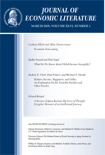
JOURNAL OF ECONOMIC LITERATURE
Uncovering insights in the world of economics.JOURNAL OF ECONOMIC LITERATURE, published by the American Economic Association, stands as a premier academic journal in the field of economics, with a notable Q1 classification in Economics and Econometrics for 2023. Operating from its base in Nashville, TN, this journal has established itself as an indispensable resource for economic researchers and practitioners alike, boasting an impressive Scopus ranking of 10 out of 716—placing it in the top 2% of its category. The journal's commitment to providing comprehensive critical surveys of the literature enhances the understanding of various economic topics, making it a vital tool for researchers seeking to deepen their knowledge or explore new areas of inquiry. Although it operates on a subscription basis, the journal’s high impact on the economics community underlines its importance in advancing the field. With coverage spanning from the 1980s to the present, JOURNAL OF ECONOMIC LITERATURE continues to encourage rigorous scholarship and bridge theoretical and empirical research, enabling informed discourse among economists globally.
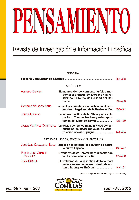
PENSAMIENTO
Connecting Minds Through Philosophical ExplorationPENSAMIENTO is a distinguished journal published by the Universidad Pontificia Comillas Madrid, Faculty of Philosophy, providing a platform for scholarly discourse in the field of philosophy. With its ISSN 0031-4749 and E-ISSN 2386-5822, the journal has embraced Open Access since 2016, promoting wider dissemination of philosophical research and thought. Located in Spain, it has established itself as a vital resource for academics, researchers, and students interested in contemporary philosophical inquiries and discussions. As of 2023, PENSAMIENTO is ranked Q3 in the Arts and Humanities, specifically within the Philosophy category, highlighting its emerging impact in the scholarly community with a Scopus rank of #575 out of 806, placing it in the 28th percentile. With its coverage spanning from 2002 to 2024, PENSAMIENTO is committed to contributing to the ongoing evolution of philosophical thought and ensuring that fresh perspectives can thrive within academia.
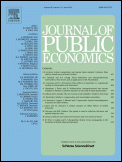
JOURNAL OF PUBLIC ECONOMICS
Advancing the discourse in public economics.JOURNAL OF PUBLIC ECONOMICS is a leading academic journal published by ELSEVIER SCIENCE SA, dedicated to the field of public economics, which encompasses a broad range of topics including taxation, government expenditure, and the effects of public policies on the economy. With an impressive impact factor reflected by its prestigious Q1 category rankings in both Economics and Finance, this journal is recognized as a vital resource for researchers and practitioners alike. Its robust Scopus rankings place it in the top percentile, with Finance ranked #8 out of 317 and Economics ranked #19 out of 716, demonstrating its influential role in advancing knowledge and fostering discourse within its discipline. Covering the period from 1972 through 2024, the journal publishes original research and insightful reviews that encourage evidence-based policy-making, making it an essential read for those seeking to deepen their understanding of the intersections between economics and public policy. Please note that the journal operates under a subscription model of access, ensuring high-quality content is readily available to its readership.